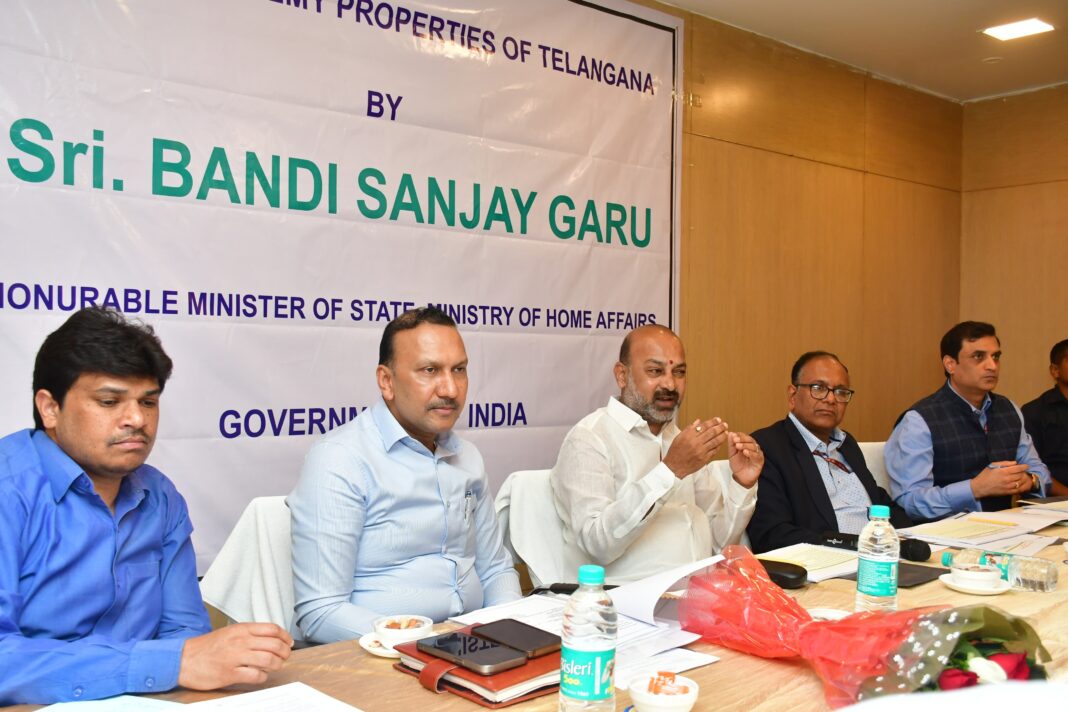The Union Minister of State for Home Affairs, Bandi Sanjay Kumar, issued orders to the officials of the Custodian of Enemy Property in India (CEPI) to finalise the list of enemy properties by March-end. Sanjay directed officials to complete the review of records and the ground survey of enemy properties under the protection of the Custodian of Enemy Property for India (CEPI) by March-end.
Sanjay chaired a meeting on Saturday to review enemy properties in the districts of Hyderabad, Ranga Reddy, Kothagudem and Vikarabad.
This is the second review meeting of enemy properties after Sanjay became Union Minister. He also inquired about the progress made after the last review held in November.
The meeting was attended by CEPI officials from Delhi and Mumbai, the Telangana Revenue Principal Secretary and CCLA Naveen Mittal, Sanjay’s Secretary Andra Vamsi, Ranga Reddy Collector Narayana Reddy and the RDOs of Hyderabad, Secunderabad and Vikarabad.
During the meeting, Sanjay initially sought details about enemy properties in Ranga Reddy district, particularly in Kotwal Guda and Miyapur, comprising hundreds of acres. Ranga Reddy Collector Narayana Reddy provided an update on the progress, survey number-wise, noting that some properties had been encroached upon and others were occupied by farmers.
Sanjay emphasised the need to ensure justice for farmers who had held the land for years while simultaneously preventing government land from being grabbed. He asked officials to complete the survey, record verification by the end of March and to submit a report.
In the case of enemy properties in Bakaram, Hyderabad, officials reported that out of the disputed 25,503 square yards, 5,578 square yards are enemy properties, with 20 families currently occupying the land for residential and commercial purposes.
Similarly, in Rikab Gunj, Bahadurpura, 3,300 square yards of enemy property were identified in survey numbers 710-724 and 778-784. The officials also mentioned a plot registered under DS Dyodi Galib, which lacked identifiable survey numbers and location details. Responding, Sanjay directed a joint inspection by the CEPI and state revenue officials followed by a detailed report.
In the Palwancha area of Kothagudem district, 40 acres of agricultural enemy property in survey numbers 126/111 and 126/112 were reportedly occupied by some farmers. Sanjay ordered an inquiry by CEPI in coordination with district revenue authorities to resolve the issue.
Sanjay also reviewed the enemy property dispute in Allampalli in the Vikarabad district, involving 17.22 acres in survey numbers 426, 427, and 428. Officials reported that the land was occupied by the Shubhaprada Patel Nooli family, with 2.18 acres acquired by the railways for a railway line.
Sanjay sought clarification from the CEPI on the legal provisions applicable to such disputes. CEPI officials explained that under Section 8A, individuals who purchased enemy properties unknowingly, the legal heirs of the original owners, and leaseholders could apply for regularisation.
He asked officials to resolve these disputes in accordance with Section 8A.
The Centre has decided to establish branch offices of the CEPI in Telangana, Andhra Pradesh, Tamil Nadu, Karnataka and Kerala. Currently, enemy property matters in these states are overseen by the Mumbai CEPI office. The Centre decided to set up regional offices of the CEPI including the one in Hyderabad.
After the 1962 Sino-Indian War and the Indo-Pak wars of 1965 and 1971, the Indian Government designated properties belonging to individuals who migrated to Pakistan or China and acquired citizenship there as enemy properties. The Custodian of Enemy Property for India (CEPI) was entrusted with their protection.
There are approximately 13,000 enemy properties across 21 states and 2 Union Territories, including Telangana and Andhra Pradesh. These properties are worth thousands of crores. Under Section 8A of the Enemy Property Act, the Centre has the authority to sell these properties. However, many of these properties have been illegally occupied or are entangled in legal disputes. The meeting chaired by Sanjay focused on resolving these disputes.




